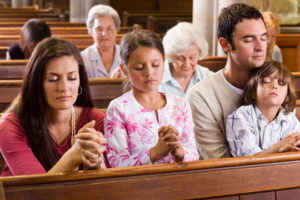 We believe it is a great privilege for a child to grow up in a Christian home and for the entire family to worship together, week in and week out in the Sunday morning worship service. Over time, this teaches the child much in the way of what a normal life as a Christian is to look like as well as the necessary connection each of us is to have with the local church. Here at King’s Church, we believe parents should keep their children with them throughout the entire service.
We believe it is a great privilege for a child to grow up in a Christian home and for the entire family to worship together, week in and week out in the Sunday morning worship service. Over time, this teaches the child much in the way of what a normal life as a Christian is to look like as well as the necessary connection each of us is to have with the local church. Here at King’s Church, we believe parents should keep their children with them throughout the entire service.
Let me say this again (in different words) – rather than children or teens attending their own meetings separate from their parents, we believe that the Biblical pattern is for families to worship together. The only exception we see to this (both now and in the future) is to provide a safe place for the under 3’s in a nursery. However, we do not wish to segregate older children and teens from the rest of the congregation – sending them off to different rooms or buildings. Instead, on earth, as it is in heaven, young and old together, with one voice in unity, we the gathered people of God worship Him together.
We also believe that there are times when it is entirely appropriate for specialized ministry to take place (outside of the Lord’s Day morning service). One Biblical example of this is that older women are exhorted to teach the younger women (Titus 2:3-5), which presumably means that men are excluded from such a gathering.
While in no way wishing to be divisive or suggest that we are the only church in town obeying God, we practice “Family Integrated Worship” because of certain convictions we have. As we examine the Biblical data, we find that throughout the centuries this has been the normal way in which the people of God have gathered. This is clear from both the Old and New Testaments.
Deuteronomy 31:11-13 reads, “When all Israel comes to appear before the LORD your God at the place that he will choose, you shall read this law before all Israel in their hearing. Assemble the people, men, women, and little ones, and the sojourner within your towns, that they may hear and learn to fear the LORD your God, and be careful to do all the words of this law, and that their children, who have not known it, may hear and learn to fear the LORD your God, as long as you live in the land that you are going over the Jordan to possess.”
Joshua 8:35 says, “There was not a word of all that Moses commanded that Joshua did not read before all the assembly of Israel, and the women, and the little ones, and the sojourners who lived among them.”
Ezra 10:1 – “While Ezra prayed and made confession, weeping and casting himself down before the house of God, a very great assembly of men, women, and children, gathered to him out of Israel, for the people wept bitterly.”
These and other scriptures testify to the fact that when God’s people assembled, it was normal for children to be included.
In the New Testament, children were present during Christ’s preaching and teaching ministry (Matthew 14:13-21).
When Paul wrote to the Church at Ephesus, he included a message for the children (Eph. 6:1-3). In doing so, a clear assumption was in his mind; that when his letter was read to the gathered Church, children would be present in the service to hear it. The same assumption can be found in Colossians 3:20, where we read, “Children, obey your parents in everything, for this pleases the Lord.”
In recent decades, many have practiced a very different model for doing Church, something called “age segregated worship” where the family is split up, fragmented and isolated from each other in the service. We have now had a great deal of time to assess the long term effects and fruit of such ministry. The results are in and what we have observed has not been good. While church growth did occur, at least initially in the short term, when teens become adults we see a severe lack of participation in the life of the local church. The percentage of teens in youth ministry who make the transition to regular, ongoing participation in the local Church as adults, is alarmingly low. That is tragic and heart breaking!
In the light of this, we need to ask an important question: Could it be that the model we have used may be a big factor in this?
We believe so. While the age segregation model was adopted in hopes of it being a blessing to children and youth, the unintended consequence of this is a thoroughly ingrained notion in our kids that to do church, a person must be with people of a similar age. Sadly, in a very real way, this is what we have taught them.
THE SHEPHERD AND THE FLOCK
When a person, raised in an age segregated model Church leaves their teenage years behind, they might have gone through the entire course of childhood and never been with adults, couples and seniors in corporate worship. Let that sink in for a moment. They might even have been in the same local Church all that time and never known the pastor and elders. The pastor is an irrelevant figure in their lives. The child’s parents may know him but not the children. Oh, they might have perhaps seen the pastor’s photo a few times on a Church brochure. Maybe…. But they have had no personal interaction with him. They may never have (or very rarely) heard him speak. Given that the pastors/elders’ role is to shepherd the entire flock (Acts 20:28; 1 Peter 5:2), this is a very sad state of affairs and one that we contend is thoroughly unbiblical.
Is it any wonder then that with no specially marked room for those in their young twenties to go to during the Sunday worship service, they feel very out of place when, perhaps for the very first time, they are now having to worship alongside people of a different age? This is entirely new to them. They have never had to do this before. It is very difficult for them to find any sort of connection with the gathered church because we have taught them to be disconnected.
Because of this you will see the absence of age-graded ministries at King’s Church. This is intentional on our part. While there may be times for children to be gathered together in order to be taught; similarly with teens, there is no specifically segregated youth or children’s ministries here as we do not find such terms as “children’s minister” or “youth minister” in the Bible. The very concept is extra-biblical.
It has been well said that parents who are relieved of their discipleship duties tend to become dependent on those who have taken over the job. Instead, the Bible clearly teaches that Christian parents (rather than the Church) have the responsibility of providing their children a solid foundation in the things of God. Parents (especially fathers) are to discipline and train their children.
SPEAKING OF FATHERS
In Psalm 78:5-7 we read, “He established a testimony in Jacob and appointed a law in Israel, which he commanded our fathers to teach to their children, that the next generation might know them, the children yet unborn, and arise and tell them to their children, so that they should set their hope in God and not forget the works of God, but keep his commandments.”
Ephesians 6:4 says, “Fathers, do not provoke your children to anger, but bring them up in the discipline and instruction of the Lord.”
RAISING FAMILY SHEPHERDS
We wish to be clear here. Church ministry provides a vital role for the family. Yet it is a specific one in serving the family by training parents to bring up their children in the things of God. Churches should teach fathers how to be family shepherds. Rather than placing the burden of children’s and youth ministry on a few “paid professionals,” churches are to equip parents to teach, train, disciple and evangelize their children. The parents’ responsibility in discipling their children is a 24 hours a day, 7 days a week assignment from the Lord. It is an entire way of life.
Speaking to parents, Deuteronomy 6 says, “You shall teach them (God’s words) diligently to your children, and shall talk of them when you sit in your house, and when you walk by the way, and when you lie down, and when you rise.”
PARENTS AND CHILDREN
I am convinced that the best thing parents can do to facilitate their children worshiping God is to model this themselves. Children cannot fail to notice parents singing hymns to God with their whole hearts, the bowing of heads in reverence while in prayer, the earnestness involved in the reciting of an historic creed of the church, as well as the very close attention given to the hearing of the word of God as it is read and when it is preached. Children also know the difference between an act of duty and an act of delight, even if they are not able to articulate the difference themselves. Joy in God is contagious. God can do much in the heart of a child when true worship is modeled before them.
The American family is fragmented enough. With the demands of life in a fast lane kind of society, it is often hard for families to even sit down to a meal together each evening. Life is hectic and chaotic and don’t we know it? My point is, the church should not be adding to the problem. Instead, we gather together and on purpose to worship God as a family. In fact, the gathering of the people to worship is families joining other families in worship of our tri-une God.
As a parent, while very conscious of my many flaws, I am jealous to be the model of worship for my kids. I want them to see a man after God’s own heart, not merely in the pages of a book, but right in front of them. I don’t want to hand over this amazing God-given opportunity and responsibility to someone else whom I do not know.
God made me the father of my kids and He wants me to lead them to Him through the means of what they observe in my life. I want them to be in awe of God as I am, and I am eager to model this for my children. No pretense… nothing artificial… but authentic worship flowing out from a heart captured by the God he loves. If this is in any way real in my life, I am convinced that children can sense this, to a far greater degree than we might think.
Parents can also ask questions of their children after the service is over, and explain anything that was unclear or not understood. It can become an amazing opportunity to teach the great doctrines of the faith, on a level the child can absorb, in spite of the fact that many things went over the child’s head in the service. Parents can ask “what were you thinking when we did this in the service?” and by their answer, find out immediately the perceptions of the child. Then the parent can explain things and point to the Bible as to why we did what we did in the service. Great learning can occur in such moments, especially when this kind of parental/child interaction becomes a regular habit in this way.
Both the historic and more modern hymns of our time are often filled with theological words and concepts beyond the grasp of a young child. However, it will inevitably begin to make sense to a child as he grows in understanding. The fact that he does not understand everything now is not a problem. The words, and the concepts behind them, will become more and more familiar over time, and that is a very exciting prospect.
Think of this: If a child is present as the word is being preached in earnest, and all around are caught up in awe of God as His word is heralded, do you really think he/she can have no perception of this? I think the answer is obvious. A child can indeed grasp this.
Then, let me ask you: do you think they would capture this in children’s church to the same degree? Once again, I think the answer is obvious. It is not very likely. And as a parent, I would never wish my children to miss this taste of the majesty of God for all the world.
The formative years of a child are when patterns of behavior are instilled by the parents. Part of that training involves the family in worship together on the Lord’s Day. Sunday morning is different. It is sacred in fact. It is the time set aside when all in the family engages in the worship of God, along with the rest of the gathered saints and therefore, it is the task of parents to be teaching this to their children, both by precept and example.
Pastor Nick Batzig writes, “Our young children may not know and understand all that is being said from the pulpit, but they will forever have the example of sitting under sound biblical preaching.
My friend, John Larson, once told me how he had grown up in a church with a faithful pastor who preached God’s word expositionally every Lord’s Day. He said that while he didn’t remember much of what that minister said from the pulpit, he remembers the example that man set by faithfully getting up before the congregation week in and week out – to open and expound the Scriptures to the people of God. The example of a man who gives himself to a diligent study of God’s word in order to preach it to the people of God every week will impact our children for life. If we dismiss our children immediately before the sermon we are essentially taking that example away from them. Keeping your children in the service sets before them the model of God’s minister doing what is most important. This is why we should keep them in.”
He continues, “Every Christian family is (or should be) trying to figure out how to bring their children up in the training and admonition of the Lord. Every Christian family fails at points and feels the burden of their failures. It is a great encouragement when families are sitting side by side with other families in the worship service. It is a great encouragement to see young children singing hymns in the service. It is a great encouragement to see fathers leaning over and gently helping their children understand what is going on and how they can focus better. This is lost when we simply shuffle our children off to ‘children’s church’ until they are teenagers. This is yet another reason why we should keep them in.
Though I have – at many, many times – felt my own insufficiency and failings as a father, I have also been encouraged by what the Lord is doing in the lives of my sons – especially during the worship service. The other day, I looked out over the congregation as we were singing and I saw my 8, 6 and 5 years olds trying to sing from the hymnal.
I, (as a pastor) unlike so many fathers in our church, do not have the privilege of training my children during the worship times. I try to train them during our times of family worship. That sight of my sons participating was a joy and delight to my heart. That evening, friends of ours visited our church.
After the service, the husband came up and said, ‘It was so encouraging to see your sons singing There is a Fountain Filled with Blood without a hymnal.’
This was an enormous encouragement to me – in light of all of the failings and shortcomings that I am so painfully aware of regarding the shepherding of my family.
Likewise, when parents keep their children in the service for months and years, they will begin to see these sorts of encouragements. As their children hear the same hymns sung repeatedly, as they tell their parents something that they heard in the sermon, or ask a question about some part of the service, this is a great encouragement to the parents to continue to pursue training their children in the Lord. It makes us want to foster that growth that we begin to observe.”
DISRUPTIONS HAPPEN
As a church adapts to children being present throughout the worship service all of us are in training. The congregation needs to grasp the fact that children are not perfect, nor will they be. Congregational awareness is a vitally important component in all of this. And yet, on the other hand, parents need to be sensitive also, if not more so. Parents should make sure that an entire service is not disrupted by the noise of a child.
Concerning this, once again Pastor Batzig writes, “I wholeheartedly agree that the whimpering cry of a baby can be precious; but, more often than not, the crying of infants and whining or talking of toddlers is disruptive to the minister(s) and congregants. It is selfish when parents insist on keeping their crying baby in the service. If a congregant was constantly coughing or sneezing, the loving thing for that individual to do was to dismiss himself or herself from the service until their cough subsided. So too, parents ought to lay aside their right to have their child in every second of the worship service and care for the other members of the congregation who are seeking to listen to what is being said.”
With all this being understood, let us remember that our children are not merely the church of tomorrow, but the church of today. They are very precious to the Lord and to us. As we gather together on the Lord’s Day, may we worship God according to how He commands, not according to what may be popular in a particular culture and time.
May we stand in the tradition of Reformation faith and practice, gathering with God’s people each Lord’s Day to exult in God’s truth, thrill over His mercies and graces, and worship His magnificence out loud! As we do, may the Word of God be read, preached, prayed, sung and seen (in the ordinances of baptism and the Lord’s Supper), for the edification of all of Christ’s precious sheep – young and old, men and women, parents and children, visibly, publicly, together.



